How Dlala survived the loss of a $3m Disney deal
CEO Aj Grand-Scrutton shares the cautionary tale of a studio whose life-changing game was scrapped without warning
"The rose-tinted glasses were fully on. We were a 14-person studio with a big contract from Disney, the biggest agent in the world - we were unstoppable. All the scrounging by, never having money - we would never have to work for a deal again, because even this wasn't a success, we'd made a bloody game for Disney. We were going to have contracts thrown at us. Why would we believe anything else?"
By the end of 2015, Aj Grand-Scrutton and the team at Essex-based indie Dlala Studios were on top of the world. But this elation was short-lived.
Just a few months later, in May 2016, Disney opted to cancel all video games publishing operations following heavy losses accrued by toys-to-life series Disney Infinity, and Dlala's secret but life-changing project was terminated. It was the end of a long and once promising journey.
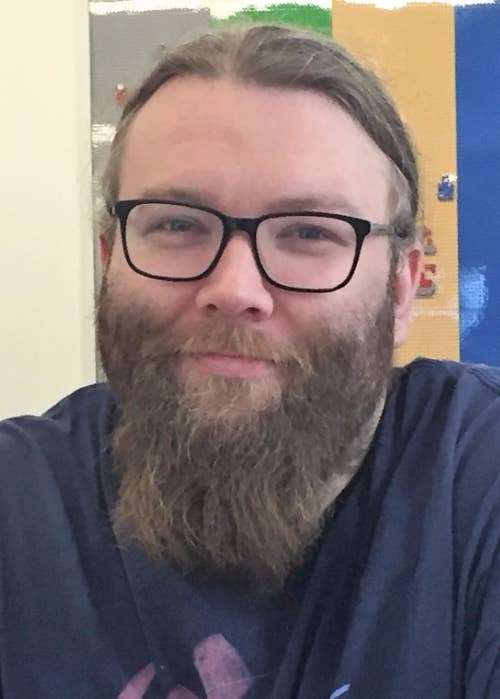
Founded in 2012, pre-Disney Dlala was the first internally incubated games studio at Microsoft and made Windows 8 launch title Janksy. This was followed by the ambitious but unsuccessful Overruled, but the company's rise enabled them to sign with the US-based Creative Artists Agency.
As the studio's future was bolstered by contracts for government training games, CAA suggested Dlala should attend DICE and pitch for more work, helping to arrange 33 publisher meetings across three days.
"There was one meeting where I turned to the agent and said, 'I don't think there's any point me doing this, they're not going to want to see me' - it was with Disney," Grand-Scrutton tells GamesIndustry.biz. "He said, 'no, you've got to do it. When you signed you promised you'd listen to me'. So I met with Disney, who was interested in the stuff we'd done with Overruled and our ethos with the studio.
"They asked if I would be able to go to L.A. a couple of days later. Well, it's only a 40-minute flight from Vegas - plus it's where Universal Studios is, which I really wanted to go to."
In Los Angeles, he met Disney Interactive executive producer Chris Nicholls, who also took an interest in the cartoony animation style for Overruled.
"He told us they had one of their big IPs - probably their biggest, and one of the biggest in the world - that they were looking to reboot for a new generation, and were interested in games that do dynamic changing, which we did a lot with Overruled. Would we be interested in working with them? And obviously, it's fucking Disney - we're all Disney fans, we're the perfect age, we grew up with the Disney stuff, so we were like, yeah, what do we need to do?"
"Suddenly, it was like 'holy crap, we're not five guys in a garage'. We were in an office, we had the world's biggest agency, a $250,000 contract - it was all really positive"
Aj Grand-Scrutton
Dlala was tasked with coming up with a game concept around the most classic and iconic characters Disney owns. The firm promised to pay $250,000 for pre-production, and if the pitch was approved, it would be a $2 million contract.
"And we were like... holy shit. We can do this."
The studio conceived a four-play couch co-op platformer, an episodic Metroidvania-style affair, where progress would unlock new episodes, new worlds and new areas in previous episodes.
The art style was built around hand-drawn characters, with Dlala even able to secure the talent behind the Earthworm Jim series to handle the animation. Things were finally getting serious for the studio.
"Suddenly, it was like 'holy crap, we're not five guys in a garage'," says Grand-Scrutton. "We were in an office. We had the biggest agency in the world behind us, a $250,000 contract, it was all really positive and we loved making this."
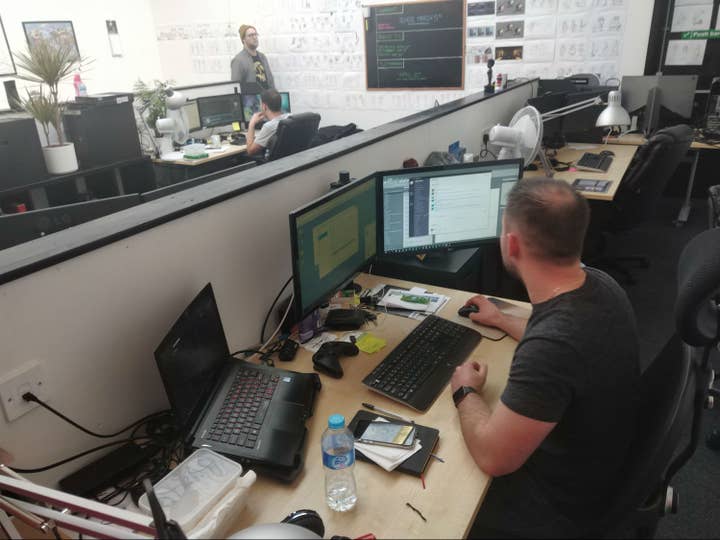
By this point the studio had grown to six people, with the team flown out to L.A. for a VIP trip to Disneyland and the all-important greenlight meeting. To this day, Grand-Scrutton is still grateful for the incredible treatment his colleagues received.
"We used to joke that with the combination of an agent, a massive client and all this treatment, we felt like we were on Entourage - except none of us are handsome."
"We can still talk about the Disney story, because that's important and a big part of the history, but we also need to show we've moved on from that"
Gemma Foster
Grand-Scrutton and co-founder Craig Thomas went to Disney and played through the build, impressing Disney with the animation style and even asking for an extra million to ensure the Earthworm Jim artists could stay on.
An agonising two-and-a-half hour wait later, Dlala was given the greenlight. The guys in a garage had secured a $3.5m deal with Disney.
The team's excitement fueled some big changes. Dlala began hiring, including an office manager, it's first in-house artist, a producer, IT support - plus, Grand-Scrutton says, "all the jobs I was doing that I couldn't any more now that we were going to be a proper studio".
"Until then, we'd winged it," he says. "We'd always winged it. Our approach had always been, if we have to blag we would, but only when we had the confidence we could achieve what we promised. When you sign a deal this big, you can't really live like that anymore."
By January 2016, the team had grown to 14 people - despite Grand-Scrutton and Thomas never planning to go beyond eight. Work on the project was going swimmingly... but during a meeting at Disney, the studio heads soon got the sense that something was off.
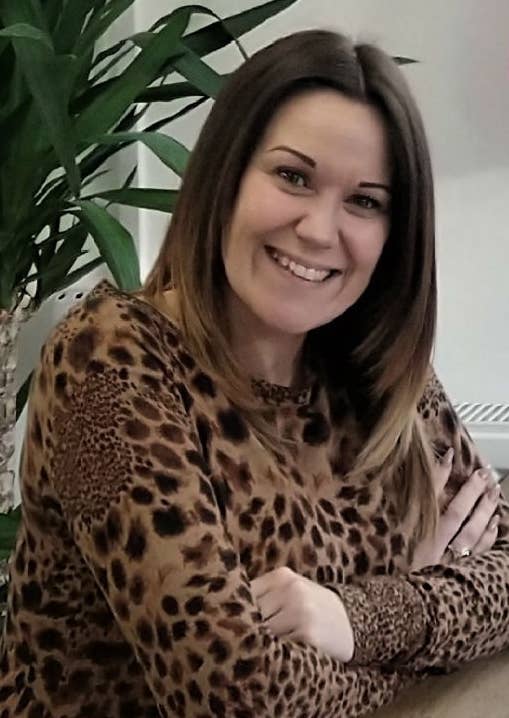
"It was the first time there felt like there was some kind of unrest," operations director Gemma Foster tells us. "It didn't feel like it was in relation to our game, but there was a general vibe that something was changing.
"There were a few questions that we started to be asked, like what would we do if we made part of the game free-to-play somehow? They were all very hypothetical questions, but ones that we'd never been asked before."
Upon returning to England, Dlala decided it was time to "batten down the hatches". The studios started to become much more cautious with the money they were spending, only investing in things they were committed to adding to the game. Foster's arrival at the studio also revamped how budgets were handled - prior to her joining, Grand-Scrutton had a single spreadsheet with two columns: money in, money out.
Their fears were not unfounded. On March 30, at 9pm UK time, executive producer Chris Nicholls called Grand-Scrutton and told him the platformer had been canned.
There were some silver linings. While Disney owned the IP, it acknowledged the tech behind the game was Dlala's, and promised to pay the current milestone. But the game was dead.
"Don't be fucking stupid. You haven't got the money in the bank, and all these contracts state they can just kill the project whenever they like"
Aj Grand-Scrutton
"For better or for worse, we've always tried to shield our team from all of the crap that goes on, all of the politics because it doesn't help them make games if they know there's unrest," says Grand-Scrutton. "But I had to go in on the 31st, pull the team into a room and tell them.
"The good thing about the team is I said, 'if you guys want to take the rest of the week to recover or rest...' and they were like 'can we just start some game jams and figure out some new concepts?'"
It was a heartbreaking turn of events, particularly as the game was only months from being viable to launch.
At first, Grand-Scrutton and Thomas assumed this was Disney "cutting the fat on smaller projects" but as news emerged of the Disney Infinity deficit, they understood that it was part of a far bigger problem for the entertainment giant.
Nicholls reassured the team that they had done nothing wrong, that Disney was grateful for their work, and messages of support and commiserations from those in the know flooded in - but it was small consolation, particularly given the precarious position Dlala now found itself in.
"[Without Disney's game], all we were known for was Janksy - a Windows 8 game we'd made in nine weeks - and Overruled," says Grand-Scrutton. "That was it. We'd been around four years and those were the only things anyone knew we ever did. But that reality didn't kick in at that point. It did once we were trying to get money.
He continues: "We had money, the most we'd ever had in the bank, but we had no more coming in. Of course, the rose-tinted glasses were still on. I was still convinced that because we'd worked with Disney for a year and a half, and we had the biggest talent agency in the world, we weren't going to struggle."
Foster adds: "We were also aware that this couldn't happen indefinitely. We knew if nothing happened by a certain time - initially the end of the year - we had to regroup and might need to change direction."
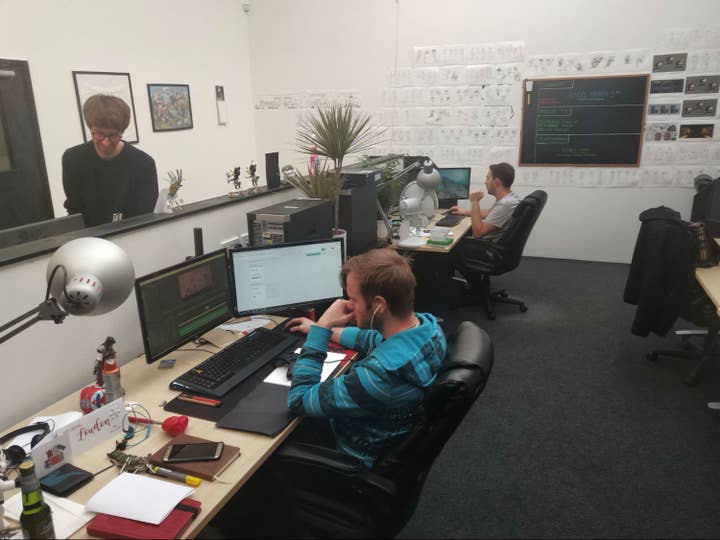
At first Dlala hoped to work on original IP, evolving one of its game jam concepts into current project Nothing To Fear, a comic point-and-click adventure about restoring the reputation of the bogeyman.
Grand-Scrutton recognises how luxurious a position this was: "In the games industry when do you ever, without a successful game, have money to work on your own thing?"
"We used to joke that with the combination of an agent, a massive client and all this treatment, we felt like we were on Entourage - except none of us are handsome"
Aj Grand-Scrutton
Cost-cutting began in earnest, dropping perks Dlala had enjoyed in the Disney days such as free massages. By mid-2017, the studio's outgoings were down to a third of what they had been.
Part of this can be attributed to the departure of some members of staff, the headcount dropping from 14 to nine, but Grand-Scrutton stresses that "no one lost their job because of this". Instead, some team members simply opted to move onto other projects.
In March 2017, both Grand-Scrutton and Thomas agreed to take less money for themselves. This was not the first time they had sacrificed their own pay to save the studio, having already worked for free in late 2014 so the team could "make it past Christmas."
"We've never been those guys who take eighty grand home in dividends, we'd never been extravagant - everyone at Dlala earns what they should," Grand-Scrutton says. "But we decided to take less money to try and extend our run a little bit."
Shortly after, Thomas announced he was leaving the studio - and indeed the industry - to take up teaching.
"He never bounced back from the Disney thing," Grand-Scrutton recalls. "Everything was very amicable, but the guy I'd started the company with in a garage was gone."
This precipitated further change at Dlala. Promotions from within gave Grand-Scrutton a more obvious management team with whom he could discuss the company's future. By this point, it appeared there was only one viable option: work-for-hire.
"[Without Disney's game], all we were known for was Janksy - a Windows 8 game we'd made in nine weeks - and Overruled. We'd been around four years and that was it"
Aj Grand-Scrutton
Grand-Scrutton had always been determined never to adopt such a model, partly due to tales of studios that had shifted towards it and never been able to work on their own IP. Grand-Scrutton, Foster and the other directors met to discuss how they might be able to do both, with the CEO making it clear that overworking their staff on multiple projects was not an option.
"There's no crunch at Dlala, there never has been," he says. "None of the shit I went through like sleeping under desks to meet deadlines that should never have been set.
"It was scary, it was a big change. Like the Disney deal collapsing, I think I was more terrified about telling the team than they were after they heard it."
Foster adds: "The focus really became sustainability. It was important to think about what people knew about Dlala - if you're going for these massive pitches, people look you up afterwards and if you're nobody, how can they work with you? If you can get in the room with people, you stand half a chance, but how do you get in the room with people? How do you make those things happen?
"We can still talk about the Disney story, because that's important and a big part of the history, but we also need to show we've moved on from that."
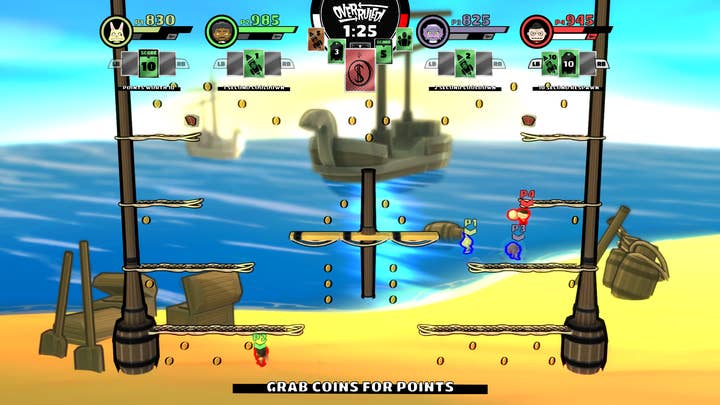
It's a strategy that has paid off, with Dlala contributing to a variety of titles from Xbox exclusive Sea of Thieves to Team17's The Escapists and upcoming indie hit Lost Words.
Grand-Scrutton is also determined not to go back to the earlier days of 'winging it', adding: “For a long time, we were surviving on being the darlings of the Windows 8 launch but we left the incubation with no deals, no money. Disney was the same except while we had money, we had no plan. Our business approach had to change.”
"For any deal over 12 months, you have to understand the industry is going to shift. That's where the risk is"
Aj Grand-Scrutton
To this day, the CEO doesn't blame Disney, recognising that the retreat from games was the best way to cut the losses being made by Infinity and protect as many jobs as it could. And he is beyond thankful for Foster's insistence on better budgeting - something she believes can save studios from a similar fate.
"It can be daunting, it can be scary, and you might not feel you have the expertise to deal with all this type of stuff, but you have to try and structure your agreements so they make sense," she says. "Don't be putting money forward before you're getting it back, in terms of milestones. Try to break the deal up in a way that gives you a sense of cash flow."
Grand-Scrutton is also keen to protect other studios from the sudden change in fortune Dlala suffered. The studio learned valuable lessons from this experience, and he's more than happy to share them.
"For any deal over 12 months, you have to understand the industry is going to shift," he warns. "That's where the risk is. Six-month deals are probably less risky, because everyone has already blocked out their financial year. Once you start going across multiple financial years... I mean, look at Facebook games and how high they were riding back in the day. Then suddenly, mobile took over and all of a sudden Facebook was dead, you didn't make money there."
There may well be GamesIndustry.biz readers in the midst of their own business-transforming projects, collaborating with giants from the world of entertainment and seemingly guaranteeing their future. To those believe themselves to be unstoppable, as Dlala once did, Grand-Scrutton only has this to say.
"Don't be fucking stupid," he laughs. "You haven't got the money in the bank, and all these contracts state they can just kill the project whenever they like. Just because you've got a $3m deal doesn't mean you end up with $3m.
"If you let a deal come to the end before you start pitching for the next thing, you're fucked. Because even if the game comes out and you have a good back end deal, you still need revenue generating. It's going to be months before you see that money.
"If we today signed an 18-month deal, we would probably at most take three or four months off of pitching and then while we're finishing up with a year-and-a-bit left, we be out there pitching for the thing afterwards.
"That big deal is singular. It could stop at any point. Yes, we were lucky that we'd picked up on the vibe and decided to batten down the hatches, but officially the only notice we got was a phone call at nine o'clock at night saying the project didn't exist anymore."
